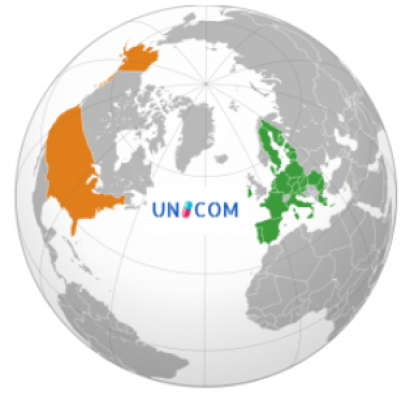Coordinating IDMP implementation with North America
Trans-Atlantic outreach is vital. The more that ISO IDMP standards and related coding systems are coordinated globally, the higher will be the eventual benefits for patients, healthcare providers, industry, and regulators. Working together across the Atlantic is a core element in building this coordination as international collaboration is a key focus of UNICOM activities.
Work started a decade ago on trans-Atlantic cooperation continues actively today. UNICOM is fully in line with the scope and purpose presented in the “Memorandum of Understanding Between the United States Department of Health and Human Services (HHS) and the European Commission on Cooperation Surrounding Health Related Information and Communication Technologies.” The MoU was signed in December 2010 to illustrate a strong commitment to trans-Atlantic cooperation in Digital Health with the Office of the National Coordinator for Health Information Technology (ONC) serving as the HHS lead US agency representative for this MoU.
Two collaborative cross-Atlantic meetings were run by UNICOM in 2021, attendance at both was by invitation.
On the 8th of June 2021, UNICOM organised its first trans-Atlantic event. The online meeting brought together 25 IDMP experts. Together, they explored the situation in the US, in Europe, and globally. Representatives were present from the US FDA, the European Medicines Agency (EMA) and, globally, through a representative of the World Health Organization (WHO) Uppsala Monitoring Centre (UMC) for Pharmacovigilance.
The meeting discussions brought immediate benefits for UNICOM, just three days later. In a webinar organized by the FDA on the 11th of June 2021, important work by UNICOM was highlighted as providing solid IDMP-related assets. They included the IDMP Gap Analysis Report and the UNICOM Pilot Product List (PPL). The PPL identifies 34 active substances contained in either popular or complex medicinal products marketed in Europe for which IDMP attributes will be provided by participating national authorities. The relevant data were identified in close collaboration with the WHO’s UMC and provide a database for IDMP piloting.
A second successful meeting invited trans-Atlantic participants (n=30) was organized on November 16th 2021, which included 13 representatives from FDA and other US organizations such as the National Library of Medicine (NLM), the National Council for Prescription Drug Programs (NCPDP), and the Center for Patient Safety Research and Practice. Participants from medical research (Harvard University), SDOs (CDISC, HL7 International, OHDSI, ISO TC 215) and industry, together with UNICOM WPs 1, 2, 3 and 4 were represented.
This second meeting was built around UNICOM WP activities and achievements which generated a number of proposals for continued engagement and active trans-Atlantic alignment of IDMP development with related regional and international initiatives. It aimed to provide a deep dive into the work performed by UNICOM, particularly the work which has the strongest impact on regulatory activities of National Competent Authorities including the following: (1) marketing authorisation data streams; (2) identification and data base management of substances; (3) European IDMP compliant submission forms for new medicinal products, variations and renewals; and (4) various IT scenarios for IDMP implementation at EU national drug agencies.
Various UNICOM success stories were highlighted at the meeting.
The development and implementation of the European Substance Registration System (EU-SRS) serves as successful example of the expertise and contributions provided by the UNICOM consortia. The UNICOM supported Substance Validation Group (SVG) recently completed the cleansing of chemicals (n=17.000) with proteins, vaccines, polymers and structurally diverse substances to follow at a later date. This achievement would not have been possible without involving FDA, NCATS, and other US stakeholders for the development of a robust substance software solution. In addition, the Master Data Management Manual for chemicals and corresponding EU-SRS user guide will also be shared with US colleagues to further promote global substance harmonization. Regular meetings will be pursued to discuss upgrades to the FDA Global Substance Registration System (G-SRS) software, which has been implemented in Europe, and other software/IT related matters.
A modern web tool supporting the creation of IDMP/ HL7 FHIR compatible datasets for the submission of new marketing authorisation applications by the pharmaceutical industry is currently under development by the UNICOM/EMA Digital Application Dataset Integration (DADI) project. The FHIR message structure will facilitate the submission of variations and renewals which may be of interest to US regulatory colleagues as this is conceptually aligned with the regulatory activities related to the US FDA CDER DIRECT platform; EU/US collaboration in this space may be of mutual trans-Atlantic interest to exchange regulatory and technical expertise and further promote IDMP collaboration for relevant regulatory use cases.
An item of priority trans-Atlantic interest concerns the review, refinement, and consensus agreement on terms/IDs for administrative dose forms as presently available from the Standard Terms Database of the European Directorate for the Quality of Medicines & Healthcare (EDQM). Inter alia, agreement is necessary to reliably compute a globally unique Pharmaceutical Product ID (PhPID); work continues within ISO and trilaterally between FDA, EDQM, and EMA.
Further discussions centred on what actors on both sides of the Atlantic can learn from each other with US stakeholders ready to explore current resources and expertise available within the EU. Likewise, EU stakeholders expressed interest to learn about the current and future state IDMP relevant initiatives within the US to include projects related to HL7/FHIR resource development and application for data exchange.
In closing, Mary Ann Slack (FDA) provided final remarks applauding the progress made with IDMP-compliant master data for Substances, Products, Organisations, Referentials (SPOR) across the EU and the FHIR-based implementation Guide for exchanging such data. She noted that the FDA has been exploring FHIR resources with acknowledgement that Europe/EMA is further along, from a regulatory perspective, on its FHIR journey than the FDA.
A trans-Atlantic opportunity exists to close identified gaps through continued knowledge exchange and increased promotion of collaborations and partnerships, as applicable. The future is now and the vision of international IDMP harmonization is one that can be universally supported by all through trans-Atlantic engagement.


